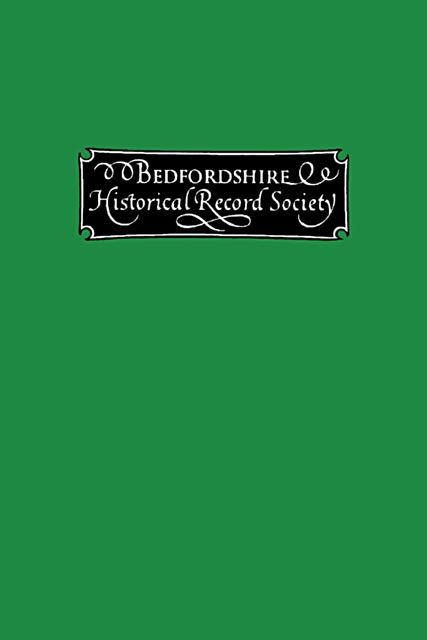Book contents
- Frontmatter
- Contents
- Abbreviations and Symbols
- The Shefford Beaker: circa 1800 B.C.
- The Morteyn Family in Bedfordshire
- The Shire of Bedford and The Earldom of Huntingdon
- The Later Descent of Wingate of Harlington
- The Disseisins by Falk de Breauté at Luton
- An Elizabethan Inquisition Concerning Bondmen
- Roll of The Justices in Eyre, 1240
- A List of Bedfordshire Apprentices: 1711 - 1720
- The Commune of Bedford
- Addendum I. “The Shire of Bedford and The Earldom of Huntingdon.”
- Addendum II. “The Disseisins of Falk de Breauté.”
- A Hand List of The Bedfordshire County Muniments : Prepared by The County Records Committee
- Index
Addendum I. - “The Shire of Bedford and The Earldom of Huntingdon.”
Published online by Cambridge University Press: 14 July 2023
- Frontmatter
- Contents
- Abbreviations and Symbols
- The Shefford Beaker: circa 1800 B.C.
- The Morteyn Family in Bedfordshire
- The Shire of Bedford and The Earldom of Huntingdon
- The Later Descent of Wingate of Harlington
- The Disseisins by Falk de Breauté at Luton
- An Elizabethan Inquisition Concerning Bondmen
- Roll of The Justices in Eyre, 1240
- A List of Bedfordshire Apprentices: 1711 - 1720
- The Commune of Bedford
- Addendum I. “The Shire of Bedford and The Earldom of Huntingdon.”
- Addendum II. “The Disseisins of Falk de Breauté.”
- A Hand List of The Bedfordshire County Muniments : Prepared by The County Records Committee
- Index
Summary
Since the article which forms pp. 23-34 was printed, the writer noticed a surprising entry on the Close Roll of 1248, by which the Escheators in Hunts, and Cambs. are ordered “that, with regard to the revenue of Simon de sancto Licio in Huntindon’ from the third penny of the County, which the King caused to be taken into his own hand by reason that in these days there is no Earl of Huntindon’, they cause him again to have (rehabere) full seisin, provided that according to justice he answer for it in the King's Court to his summons.” This seems to be the only case as yet noticed of the allowance of the third penny of the County to one who had no claims on an Earldom. The nearest comparable case seems to be that of Hugh de Courtenay; he was a distant kinsman of the last of the family de Reviers, Earls of Devon, and succeeded to their estates about 1293; he claimed the third penny of Devon from the Sheriff, and it was allowed at the Exchequer till about 1325/6, when the Treasurer disallowed it on the ground that Hugh was not the Earl; Hugh protested, and finally was created Earl of Devon with full grant of the third penny, and was acquitted of the claims made by the Exchequer for what he had irregularly received in the last 8J years. A serious search of the Pipe Rolls of the period has not been possible, but no payment to Simon de St. Liz of the third penny appears in the Rolls for 1248, 1249, 1250; it might have been paid in some other way. Both in these three years and earlier is an allowance for ‘lands granted’ (terrae datae) “to the heirs of the Earl of Huntendon 40li in Brampton and Alemundebiri” (Brampton and Alconbury co. Hunts., royal lands at Domesday).
It seemed worth while to attempt to trace this highly favoured recipient, but as the eldest son of the family seems always to have been called Simon, the separation of successive generations is merely inferential.
- Type
- Chapter
- Information
- The Publications of the Bedfordshire Historical Record Society , pp. 181 - 182Publisher: Boydell & BrewerFirst published in: 2023



